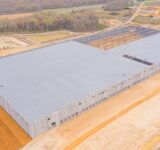(Editor’s note: This column appeared in the May issue of Real Estate NJ.)
By Michael G. McGuinness
A belated Happy Birthday to planet Earth, which just turned about 4.5 billion years old. It’s rather humbling to realize that the human race has only been around a few moments by comparison.

New Jerseyans, who inhabit one of the oldest, most urban and environmentally challenged states in the nation, sometimes lose track of how much influence we have on our environment. It reminds me of a course I took in grad school about the Gaia hypothesis. This theory proposes that organisms — humans, plants and animals — interact with their inorganic surroundings — land, air and water — to form a synergistic, self-regulating and complex system that helps to maintain and perpetuate conditions for life on the planet — global temperature, ocean salinity, oxygen in the atmosphere.
Maintaining a healthy level of connectivity is critical. This is why we need to continuously invest in our infrastructure to keep things like our economy and lives moving. People, goods, cars, trucks, trains, data, energy, drinking water and sewerage need to get places in a timely way. Where and how we live, work and play are influenced by access to these places.
No one understands this better than commercial real estate developers, owners, investors and asset managers. They are on the front lines for economic development. They are in constant communication with not only their tenants, but also prospective businesses looking to grow in New Jersey. Last October, our lawmakers acted responsibly and prudently by shoring up the Transportation Trust Fund with a 23-cent gas tax increase that was long overdue. It will be up to the new governor and Legislature, who will take over in January 2018, to make sure these precious resources (monies) are used cost-effectively to yield the greatest benefit to our residents. This duty cannot be shirked, since our taxpayers have a right to have access to opportunities, health care, basic staples, amenities, safety and security.
The magnitude of infrastructure investments needed will likely require federal help. Real estate interests are optimistic that President Trump’s “America’s infrastructure first” plan will gain traction in Congress and be implemented. A recent issue of the National Journal states, “Private financing is the backbone of Trump’s $1 trillion infrastructure plan.” The revenue-neutral plan is based on public-private partnerships that harness market forces to attract new private infrastructure investments. Deficit-neutral, it would use tax credits to offset costs with revenue from new wages from construction workers and contractors. Trump’s $1 trillion dollar plan, over 10 years, would require $167 billion in equity investment from the private sector. In exchange, investors would get a tax credit equal to 82 percent of their equity amount, which would be repaid to the government from incremental tax revenues from project construction. This form of financing lends itself to investment in revenue-based infrastructure assets such as toll roads, which offer a chance of high returns with low risks. Partisan divides may, however, stall progress.
Congress is charged with working out these details. New Jersey’s Congressional representatives should be strongly advocating for their constituents to make sure that our state gets more federal funds allocated, especially since New Jersey sends so much money in taxes to D.C. Our state should have more access to long-term direct transportation funding for the maintenance and repair of our existing highways, bridges and roads.
In addition to creating a tax and incentive environment that favors the formation of public-private partnerships to tackle major roadway, rail and water projects, there are other things that can be changed. One example is for more regulatory and administrative flexibility to states to reduce unnecessary costs and increase the speed at which projects are completed. A provision to triple funding for state revolving loan fund programs to help states and local governments update drinking and wastewater infrastructure is also part of Trump’s infrastructure plan. New Jersey has a vast amount of work to do in this area, due to the high number of combined sewer overflows and leaking underground water pipes that exist here.
Another promising initiative that’s gaining many co-sponsors and bipartisan support in D.C. is HR 413, the Partnership to Build America Act, sponsored by Congressman John Delaney of Maryland. This proposal would finance $750 billion dollars in infrastructure investment using no appropriated funds, largely by using repatriated corporate earnings. It would entail the creation of the American Infrastructure Fund, or AIF, to provide loans to local governments. The AIF would be funded by the sale of $50 billion worth of infrastructure bonds with a 50-year term. The bonds would pay a fixed interest rate of 1 percent and would be guaranteed by the U.S. government. U.S. corporations would be incentivized to purchase these new infrastructure bonds because they would be able to repatriate a certain amount of their overseas earnings tax-free for every $1 they invest in the bonds. At least 25 percent of the projects financed through the AIF must be public-private partnerships. Many benefits would accrue from this initiative, including a significant number of new jobs and a more robust infrastructure.
According to the 2013 Report Card for America’s Infrastructure, U.S. Infrastructure has a cumulative grade of “D+” with an estimated $3.6 trillion investment needed by 2020. That means we have no time to waste. Our metropolitan region would greatly benefit by the combination of P3s and enactment of the Delaney bill.
A recent letter in the Star-Ledger pointed out that the Pennsylvania Railroad built the existing Hudson River rail tunnel from New Jersey to New York City between 1904 and 1908. “Why not let private industry build the Gateway project on a build-leaseback basis, without the onerous public contract regulations and expedited environmental approvals. As a further incentive, it should be financed with repatriated money brought in with no tax penalty.” I couldn’t have summed it up better.
This year, to celebrate Earth Day, my daughters and I drove two hours to hug and pay our respects to the 600-plus-year-old white oak tree aside the Presbyterian Church in Basking Ridge. Its longevity likely had something to do with its vast “infrastructure” of roots, which enabled it to flourish for centuries. By investing wisely in our infrastructure, we can help to maintain this healthy balance among all life forms and our surroundings, and that is unequivocally sound environmental public policy.
Michael McGuinness is CEO of NAIOP New Jersey and has guided the commercial real estate development association’s progress since he joined the staff in 1997. In addition to overseeing daily operations, programs and staff, McGuinness directs the chapter’s legislative activities and manages the Developers Political Action Committee (DPAC).









